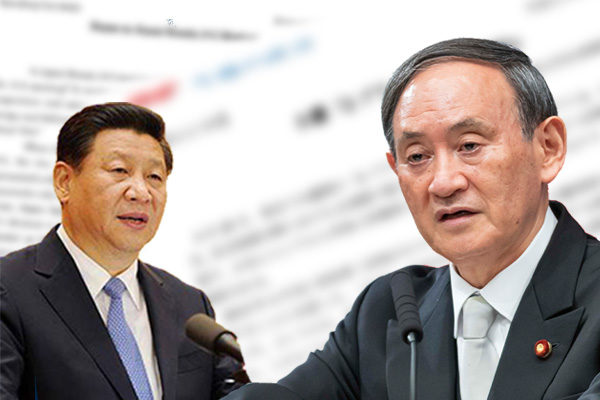While new Japanese Prime Minister Yoshihide Suga has many things to do, what he should not do is to invite Chinese President Xi Jinping to visit Japan as a state guest. Annoyed with a looming U.S.-led network to isolate China, Beijing is wooing naive U.S. allies in a bid to separate them from the United States. While attempting to drive a wedge between the U.S. and Europe, Beijing is trying to weaken the Japan-U.S. alliance by pressuring Japan to accept Xi’s visit. This is because drawing Japan would be most effective and impactful for preventing the U.S. from containing China.
Nightmare of Emperor’s visit to China
Japan had planned to invite Xi as a state guest during the cherry blossoms season this year, but the plan has failed to be implemented due to the novel coronavirus outbreak originating from the Chinese city of Wuhan. As skillful politician Shinzo Abe resigned as prime minister, Suga lacking diplomatic achievements became Japan’s new leader. China may not want to miss the opportunity. Regarding his China policy, Suga told a press conference that he would try to resolve pending problems over the South China Sea, the Senkaku Islands and Hong Kong one by one. This approach could be taken by Beijing as easy to tackle. As noted by former Taiwanese President Lee Tenghui, Beijing has been skilled in lying and temporizing in line with palace politics over thousands of years.
If paving the way for the Chinese president to meet with Emperor Naruhito as a state guest, Japan could be taken as tolerating Beijing’s suppression in Hong Kong and its use of military power for intimidating neighboring countries. If Xi requests Emperor Naruhito to visit China, we would remember a nightmare in which then Emperor Akihito’s visit to China broke through the Western bloc’s economic sanctions on China following the 1989 Tiananmen massacre.
Beijing has cajoled South Korea’s Moon Jae In government as the second best target after Japan. On August 22, Yang Jiechi, a Politburo member of the Chinese Communist Party, agreed with Suh Hoon, director of the South Korean National Security Office, that Xi would visit South Korea as soon as the novel coronavirus pandemic calms down. The Moon government has seen its policy of dialogue with North Korea having failed and plunged into a difficult position in dealing with the U.S. Trump administration over the host nation support for U.S. forces in South Korea. Furthermore, South Korea has remained highly dependent on the Chinese economy. Beijing has been taking advantage of such South Korean conditions to cajole Seoul.
Foreign Minister Wang Yi and other Chinese officials have embarked on a diplomatic offensive on the European Union in a bid to prevent an anti-China consensus from being forged within the union. However, even Italy, which has pledged to join China’s Belt and Road Initiative, has criticized China over the Hong Kong issue. France has concluded that it would be desirable to contract with European firms instead of the Chinese for the construction of fifth-generation mobile network systems. China’s diplomacy combining Chinese money and intimidation is unlikely to work in Europe where human rights are given priority.
Get ready for rejecting new Asian order
The U.S. has instigated an anti-China shift, launching a strategic competition to block a new Asian order led by China. In the future, Washington will ask Tokyo to beef up defense spending, accept the U.S. deployment in Japan of intermediate-range missiles under development and enhance restrictions on the transfer of key technologies to China. Japan can no longer maintain its convenient policy of remaining neutral over economic issues while depending on its alliance with the U.S. for national security. The Suga administration’s plan to host a Japan-U.S.-Australia-India quadrilateral foreign ministers meeting in Japan in October is commendable. Japan must demonstrate its determination, actions and unity with other democracies to resolutely block China’s forcible territorial expansionism. The time has come for the Suga administration to get ready for rejecting any China-led new Asian order.
Hiroshi Yuasa is a Planning Committee member and a senior fellow at the Japan Institute for National Fundamentals and a columnist for the Sankei Shimbun newspaper.


